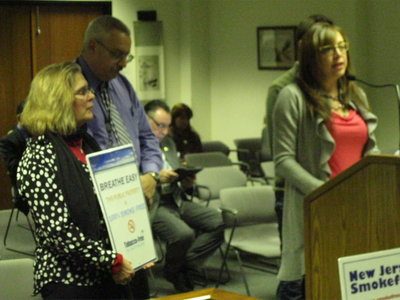Marijuana isn’t the only thing you’ll be banned from smoking in Hudson County parks in the coming months.
Taking matters a step further than requested by no-smoking advocates, the Hudson County freeholders are poised to introduce an ordinance that would ban all cigarette smoking in county parks and would impose fines on people smoking near areas where children play.
Members of the Hudson County Integrated Municipal Advisory Council appeared at the freeholder caucus meeting on Jan. 22, requesting that the county move to make county parks smoke free zones, but did not go as far as asking that fines be imposed. The state Department of Health offers free signs and encourages governments to take measures to discourage smoking in public parks, and anti-smoking advocates claim the signs tend to discourage smoking in those areas even when the ban is not enforced.
But Freeholder Bill O’Dea said that the county should take additional steps to assure that children in sports areas and playgrounds are protected from the dangers of secondhand smoke. He proposed passing an ordinance that would allow Hudson County Sheriff’s officers to issue tickets to those caught smoking within a certain distance of these sections of county parks.
The Hudson County Integrated Municipal Advisory Council is a collaboration of tobacco control experts from New Jersey and community organizations in Hudson County that includes the Bergen and Hudson County Chronic Disease Coalition. At the meeting, the council decided that the education of the public as well as of policy-makers on the benefit of 100 percent smoke-free parks and recreation areas is important.
The State Department of Health is offering free “100 percent smoke-free public place” metal signs to governments that enact these policies.
So far, Bergen, Camden, Morris, Passaic, Somerset and Union Counties have already enacted these policies. In Hudson County, East Newark and Union City have enacted smoke-free parks. Kearny, Secaucus, Weehawken and West New York have enacted partial bans in some parks and recreation areas.
According to Karen Blumenfeld, executive director for Global Advisors on Smoke-free Policy (GASP), this policy would send a public health and safety message to the county’s youth. Policy-makers mean to promote healthy examples for children that also reduce the likelihood that they will start smoking.
Attempts made to decrease litter, deaths
According to the American Cancer Society, secondhand smoke can cause harm in many ways. Each year in the United States alone, secondhand smoke is responsible for an estimated 46,000 deaths from heart disease in people who are currently non-smokers; about 3,400 lung cancer deaths in non-smoking adults; worse asthma and asthma-related problems in up to one million asthmatic children; and between 150,000 and 300,000 lower respiratory tract infections (lung and bronchi) in children under 18 months of age, with 7,500 to 15,000 hospitalizations each year.
Children exposed to secondhand smoke are much more likely to be put into intensive care when they have the flu. They are in the hospital longer, and are more likely to need breathing tubes than kids who aren’t exposed to secondhand smoke.
If passed, the ordinance would affect all eight county parks including Mercer Park on the border of Jersey City and Bayonne; Stephen R. Gregg Park in Bayonne; Columbus Park in Hoboken; Lincoln Park in Jersey City; Washington Park on the border of Jersey City and Union City; West Hudson Park in Kearny; Braddock Park in North Bergen; and Laurel Hill Park in Secaucus.
“State law says that smoke cannot travel into non-smoking areas.” — Karen Blumenfeld
__________
Blumenfeld said the proposal would protect people from secondhand smoke, removes cigarette butts and trash from parks, prevents fires and reduces cost of cleanup. As proposed by GASP, the ban would be self-enforcing.
“Most people who see the sign won’t smoke in that area,” she said. “And other people who see people smoking will tell them that it’s not allowed there.”
Alan Kantz, program manager for GASP, said this is part of an effort to limit people’s exposure to secondhand smoke, which even outdoors can be as hazardous to non-smokers at smoking is to smokers.
“We’re trying to change the culture and the environment,” Kantz said.
The 2006 NJ Smoke-free Air Act allows communities to enact local ordinances and resolutions on tobacco smoke that surpass the minimum standard. So far, 100 communities have enacted some kind of smoking limitations in the state, and 80 percent of these have made parks and recreation areas 100 percent smoke-free.
“State law says that smoke cannot travel into non-smoking area,” said Blumenfeld. “You don’t need police officers. Smokers tend to do the right thing, which means less smoking in the parks.”
Freeholder Jose Munoz said he had concerns about enforcement, but after the self-enforcement resolution was explained, was more optimistic.
Kantz said this ban is more about educating people about not smoking, rather than enforcement.
“We hope that once the county takes this on, municipalities will follow suit,” he said.
O’Dea, however, said the county should do more to protect those areas where kids are active, such a playgrounds and ball fields. The county currently only has a policy banning smoking outside some public buildings.
“I don’t want kids playing in playground with someone on a bench smoking,” O’Dea said.
One concern is for those who smoke outside Casino in the Park, a dining facility the county leases out where alcohol is served and patrons come outside to smoke.
“People walk out of events and light a cigarette,” O’Dea said. “Do we have legal authority to ban it where we have a lease? I don’t want the casino file suit against us. That’s probably only facility that serves alcohol in any of our parks.”
Because so many people use Lincoln Park in Jersey City as a shortcut, Freeholder Chairman Anthony Romano raised the question of whether the ban on cigarette smoking in parks will also apply to people sitting in their own cars.
